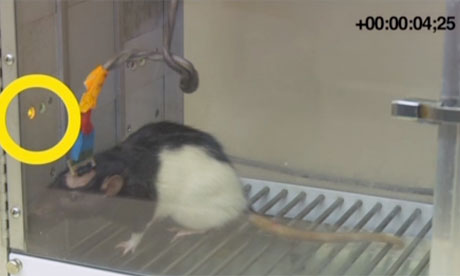Scientists Give Rats Ability to Share Sensory Information Via The Internet

These are fast-paced times we live in, and sometimes fishing your smartphone out of your pocket to check out the latest facebook status takes too darn long. But worry not! We're only a few steps away from brain-to-brain interfacing, as evidenced by two enterprising rats.
Miguel Nicolelis, whose previous innovations include devices that allow paralysed people to control computers and robotic arms with their thoughts, is working on a device to allow brains, thousands of miles apart, to share information over the internet.
Said rats have been implanted with a rather unweildy-looking device which allows them to share sensory information. In order to showcase their results, both rats were trained to press a lever when a light went on in their cage. When they pressed the lever they received a drink of water.
Devices attached, the rats were then seperated by entire continents, with a light in one rat's room, and no light in the other's. When the first rat saw the light and pushed the lever, an electronic version of the rat's brain activity was sent directly to the other rat's brain. 70% of the time the other rat reacted to this
information and pushed its lever, thus earning its reward.
More complex exercises showed the information relay to be two-way, as both rats had to communicate with one another to differentiate between narrow and wide spaces with their whiskers. Both rats had to complete the test and both relied on help from the other, or neither would get their reward. After making mistakes, the rats actually modified their behaviour to help each other out.
"These experiments showed that we have established a sophisticated, direct communication linkage between brains," Nicolelis said in a statement. "Basically, we are creating what I call an organic computer."
This research is important to helping scientists understand how brains encode information. Anders Sandberg, who studies the ethics of neurotechnologies at the Future of Humanity Institute at Oxford University believes that these studies have grander implications as well.
"The main reason we are running the planet is that we are amazingly good at communicating and coordinating. Without that, although we are very smart animals, we would not dominate the planet."
"I don't think there's any risk of supersmart rats from this," he added. "There's a big difference between sharing sensory information and being able to plan. I'm not worried about an imminent invasion of 'rat multiborgs'."

And while he may not be, this writer humbly errs on the side of caution, with Nicolelis and his team working on ways to link the minds of several animals at once to solve more complex tasks, he says ""In theory, you could imagine that a combination of brains could provide solutions that individual brains cannot achieve by themselves."
In this writer's opinion, it is only a matter of time before humanity toils under the cruel claw of its new vermin overlords. Working the fields day and night to produce copious amounts of peanut butter, and melting down our dead to create waxy balls that our rodent masters can whittle their teeth upon.
On a less silly note, the implications of this research are staggering. Imagine what sort of things we might be able to accomplish by allowing humans to directly share brain information with one another someday. Could we see something like the Point of View Gun from the latest Hitchhiker's film?

